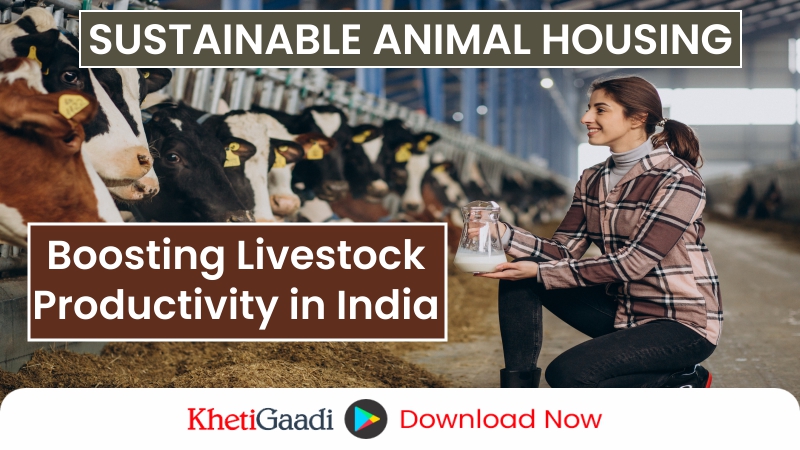Animal housing and management play a crucial role in the welfare and productivity of livestock. Proper housing and well-managed environments not only ensure animal health but also enhance the sustainability of farming practices. In India, where agriculture and animal husbandry form the backbone of rural economies, efficient animal housing systems are critical. In this blog, we will explore the key aspects of animal housing, the benefits they offer to farmers, and how government schemes in India support these efforts.
Overview of Animal Housing in India
Animal housing refers to the shelters and environments where livestock, such as cows, buffaloes, sheep, goats, and poultry, are kept. The design and management of these structures are critical for ensuring the health, safety, and comfort of animals, thereby improving their productivity. In India, various factors, including the climate, type of livestock, and available resources, influence the design of animal shelters.
Key Aspects of Animal Housing and Management
- Designing and Managing Animal Housing for Optimal Welfare
- Adequate Space: Each animal species requires a specific amount of space to ensure freedom of movement, social interaction, and comfort. Cramped conditions can lead to stress and aggression among animals, which can reduce their productivity.
- Shelter from Weather: Livestock must be protected from harsh weather conditions such as extreme heat, cold, or rain. Proper roofing and walls are essential to shield animals from these elements.
- Cleanliness and Hygiene: Regular cleaning of animal shelters is crucial for preventing the spread of diseases. Flooring should allow for easy cleaning, and waste disposal systems should be in place to maintain hygiene.
- Feeding and Watering Systems: Proper systems for feeding and watering must be designed to ensure that animals receive adequate nutrition without contamination.
- Ventilation and Climate Control for Animal Comfort
- Natural Ventilation: Adequate airflow is essential in animal shelters to reduce the buildup of harmful gases such as ammonia, which can arise from animal waste. Proper ventilation keeps the shelter cool in hot weather and reduces humidity, thereby improving animal comfort.
- Climate Control Systems: In regions with extreme weather, climate control systems such as fans, sprinklers, and heaters can be installed to maintain optimal temperatures for livestock.
- Shade Structures: In outdoor animal shelters, providing sufficient shade is essential to prevent heat stress in animals, particularly in tropical climates.
Benefits for Farmers:
- Improved ventilation and climate control systems reduce animal stress, leading to higher productivity, such as increased milk yields in dairy animals.
- Healthier animals require fewer veterinary interventions, reducing costs for farmers.
- Waste Management and Environmental Sustainability
- Manure Management Systems: Effective manure management helps reduce the buildup of harmful gases and prevents soil and water contamination. Techniques like composting or biogas production turn waste into valuable resources, which can be reused on farms.
- Water Conservation: Water is a crucial resource in animal husbandry. Efficient watering systems can reduce water wastage and help manage the supply for both animal consumption and cleaning.
- Renewable Energy Use: Implementing solar panels and biogas systems in animal farms can reduce the reliance on non-renewable energy sources, making the farm more environmentally sustainable.
Benefits for Farmers:
- Sustainable waste management practices can generate additional income streams for farmers, such as through biogas production or selling organic manure.
- Conservation of water and energy reduces operational costs, contributing to long-term sustainability.
Government Schemes Supporting Animal Housing and Management
The Indian government has introduced several schemes to promote better housing and management practices in animal husbandry. Here are some key programs:
- National Livestock Mission (NLM)
- Aimed at sustainable development of livestock through better housing, healthcare, and waste management systems.
- Provides financial support for farmers to build or improve animal shelters, invest in climate control systems, and implement waste management technologies.
- Rashtriya Gokul Mission (RGM)
- Focuses on the genetic improvement of indigenous breeds and promotes better housing and care for cattle.
- Offers financial assistance to farmers for constructing modern cattle shelters and providing proper nutrition and healthcare.
- Dairy Entrepreneurship Development Scheme (DEDS)
- Supports dairy farmers in establishing small-scale dairy units with modern facilities.
- Provides subsidies for building scientific cattle sheds, improving ventilation, and waste management practices.
Success Stories from Indian Farmers
1. Raj Kumar, Dairy Farmer from Uttar Pradesh Raj Kumar, a dairy farmer in Uttar Pradesh, implemented modern animal housing systems with the help of the Rashtriya Gokul Mission. He constructed spacious, well-ventilated cow sheds with proper waste management facilities. As a result, his milk yield increased by 20%, and he started producing organic manure, which he sold to neighbouring farms. Raj Kumar’s income increased by 30% within two years.
2. Transforming Goat Farming in Rajasthan: The Case of Suman Devi Suman Devi, a goat farmer in Rajasthan, faced challenges due to the region’s extreme heat. With financial assistance from the National Livestock Mission, she built shelters with shade structures and natural ventilation for her goats. The improved conditions reduced mortality rates among her livestock, and she now produces high-quality goat milk and meat, significantly boosting her income.
3. A Sustainable Poultry Farm in Tamil Nadu: Ramesh’s Story Ramesh, a poultry farmer in Tamil Nadu, adopted eco-friendly waste management practices by installing a biogas plant using poultry waste. With support from the Dairy Entrepreneurship Development Scheme, he upgraded his poultry sheds with automatic ventilation systems. The result was a healthier flock, reduced energy costs, and a steady supply of biogas for his household. His farm became a model for sustainable poultry farming in the region.
Conclusion
Animal housing and management practices are vital for the success of livestock farming in India. With proper shelter, ventilation, waste management, and government support, farmers can enhance their productivity while ensuring the welfare of their animals. Sustainable practices not only benefit the environment but also create additional income opportunities for farmers, leading to long-term economic and environmental gains.
Relevant Links:
Dairy Entrepreneurship Development Scheme
Ministry of Agriculture & Farmers’ Welfares
National Livestock Mission Guidelines
Animal Husbandry Government Schemes in India
Central Government Schemes for Animal Husbandry
Tags:



